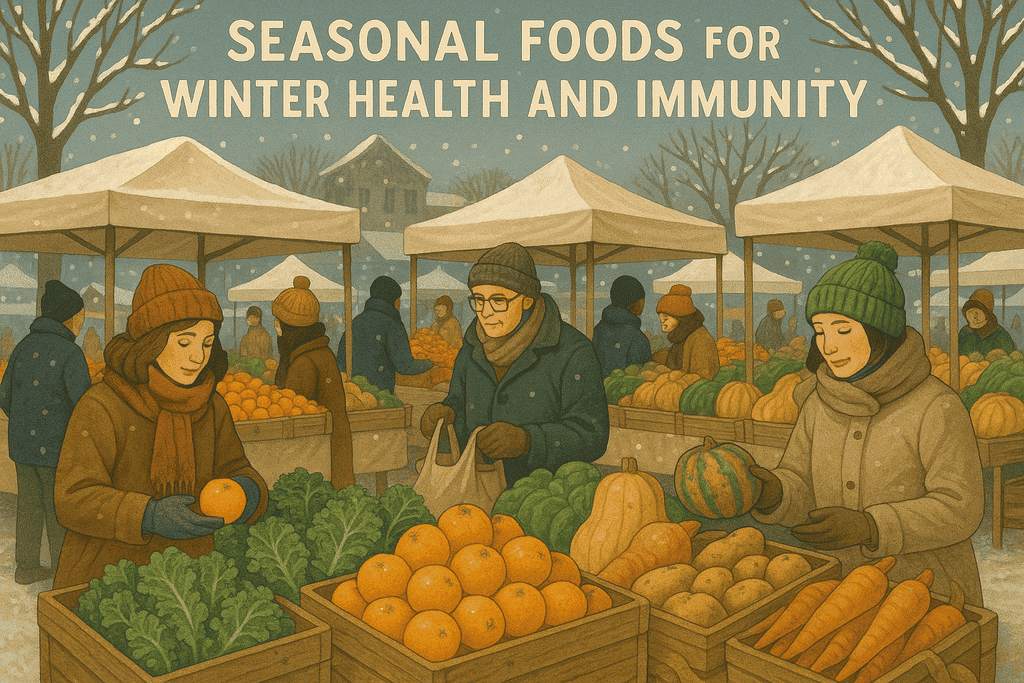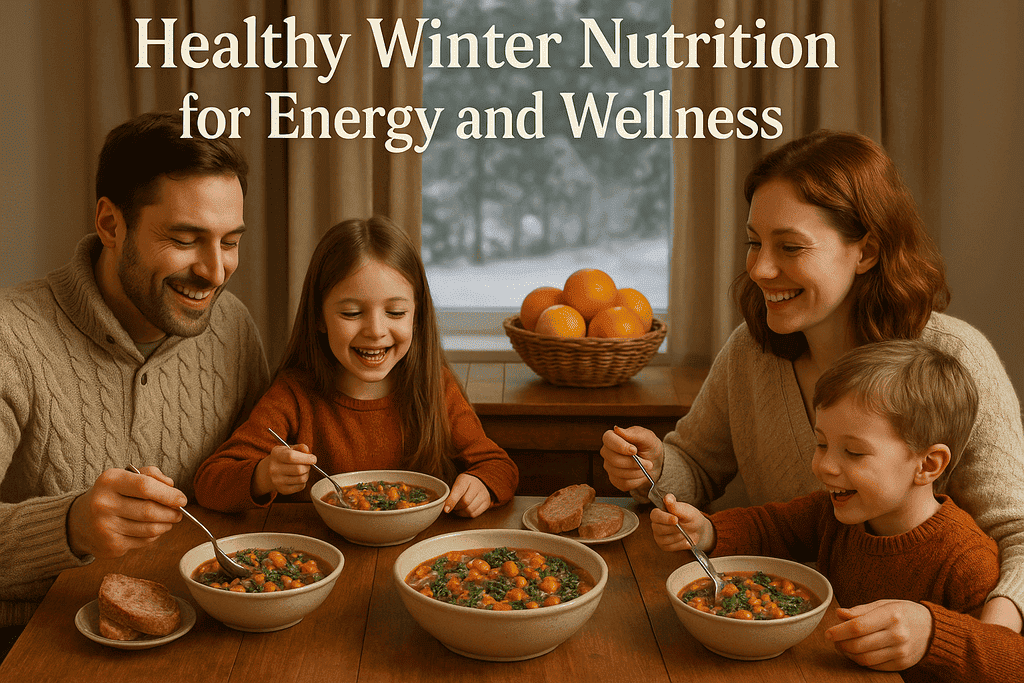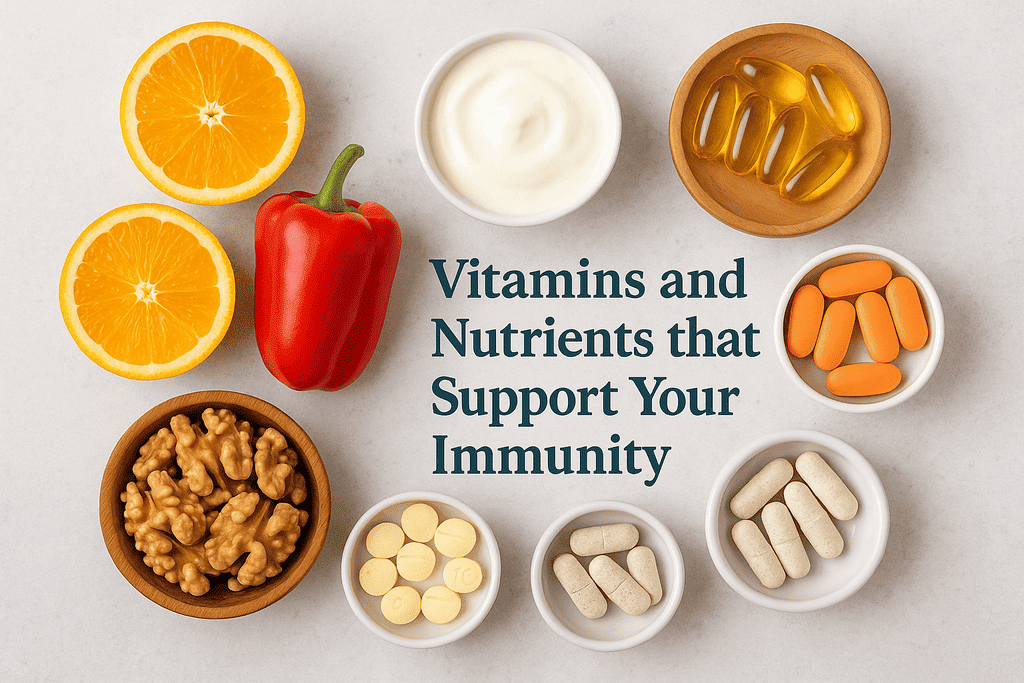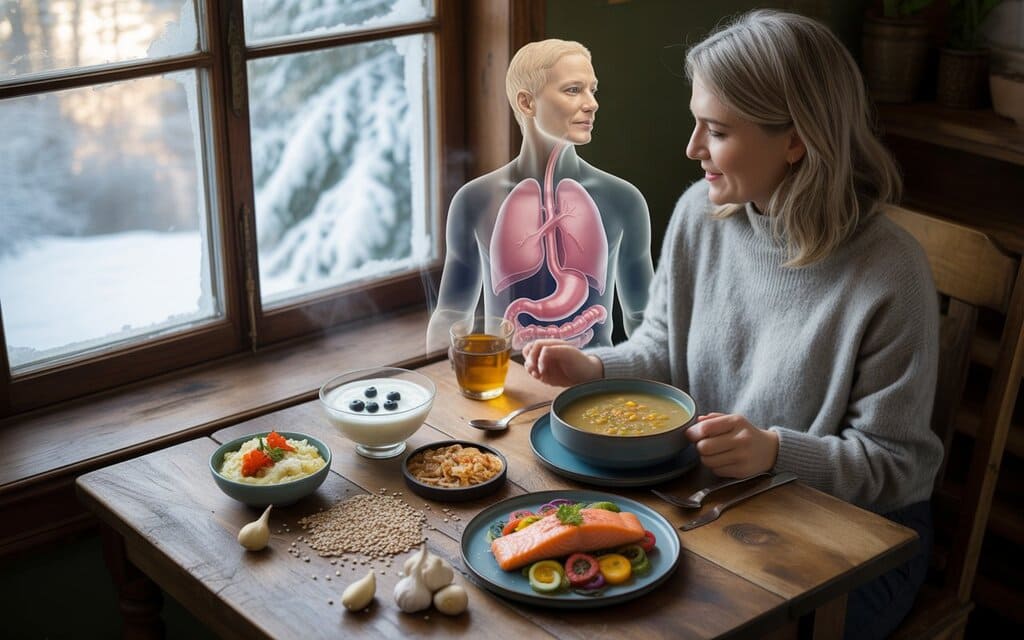
Introduction
As the days shorten and temperatures fall, our bodies face new challenges: less sunlight (which affects vitamin D), increased circulation of respiratory viruses, and changes in appetite and activity. Choosing the right seasonal foods, prioritizing nutrient-dense meals, and using evidence-based supplements when appropriate can help maintain energy, support strong immunity, and preserve overall wellness through the early winter months. This guide explains what to eat, why it helps, and how to build practical meals and habits that are both delicious and backed by recent scientific research. PubMed+1
Key Points
- Prioritize vitamin D, vitamin C, zinc, omega-3 fatty acids, and dietary fiber (prebiotics) during early winter. PubMed+3PubMed+3Cochrane Library+3
- Eat seasonal produce: citrus, root vegetables, winter greens, cruciferous vegetables, and squash — they supply antioxidants, carotenoids, fiber, and micronutrients. Allrecipes+1
- Probiotics and a fiber-rich diet support gut immunity and reduce duration/severity of some respiratory infections. PMC+1
- Use supplements thoughtfully: vitamin D supplementation shows a modest protective effect against acute respiratory infections; vitamin C and zinc may reduce cold duration if used correctly. PubMed+2Cochrane Library+2

The science : nutrients that matter this season
Vitamin D — sunlight substitute when days are short
Vitamin D helps regulate innate and adaptive immunity and is especially important when sunlight exposure drops in winter. A large meta-analysis and systematic reviews have reported that vitamin D supplementation reduces the risk of acute respiratory infections, particularly for people with low baseline vitamin D levels. Supplementation strategies vary, but many health authorities recommend checking serum 25(OH)D in at-risk people and considering daily or weekly dosing rather than large infrequent boluses. PubMed
Practical tip: If you live in a higher latitude or spend little time outdoors, consider a daily vitamin D3 supplement (commonly 800–2000 IU/day for adults, but check with your clinician). Supplementation is more effective when tailored to baseline levels. PubMed
Vitamin C — antioxidant and cold-duration reducer
Vitamin C is a potent antioxidant and supports epithelial barrier function and immune cell activity. Regular vitamin C supplementation has been shown to shorten the duration of common cold symptoms in multiple trials; therapeutic use after symptom onset is less consistently effective. Whole food sources (citrus, kiwifruit, bell peppers) also supply vitamin C plus flavonoids that may enhance benefits. Cochrane Library+1
Practical tip: Aim for a diet rich in vitamin C foods (one orange, a cup of strawberries, or a bell pepper at meals). For frequent travelers or people with repeated colds, low-dose daily supplementation (e.g., 200–500 mg) is sometimes used — discuss with a clinician. Cochrane Library
Zinc — shortens duration and eases severity of colds
Zinc is crucial for antiviral immunity and for maintaining mucosal integrity. Clinical trials and meta-analyses of zinc lozenges show reduced duration of common cold symptoms when zinc is started within 24 hours of symptom onset and formulated appropriately. Not all zinc products are equal; formulations, dose, and frequency matter. PMC+1
Practical tip: Use zinc lozenges per trial doses (often around 75–100 mg total elemental zinc per day divided while symptomatic) for short courses only; prolonged high doses can cause copper deficiency. Consult product labeling and a healthcare provider. PMC

Omega-3 fatty acids — reduce harmful inflammation, support immune balance
Long-chain omega-3s (EPA/DHA) modulate inflammatory responses and support immune cell function and resolution of inflammation. Several recent reviews and trials indicate benefits for immune balance, reduced infectious complications in some settings, and lowered chronic inflammation — all useful during winter when inflammatory triggers and infections rise. Dietary sources (fatty fish, walnuts, flaxseed) are preferred; supplements are available for those who eat little fish. PubMed+1
Practical tip: Include oily fish (salmon, mackerel, herring, sardines) at least twice weekly or take an omega-3 supplement after discussing dose with a clinician. Bureau des Compléments Alimentaires
Probiotics & fiber — gut health = immune health
The gut microbiome communicates with the immune system. Randomized trials and systematic reviews suggest specific probiotic strains and fiber (prebiotics) can reduce the incidence and severity of upper respiratory infections and may shorten recovery. Fermented foods (yogurt, kefir) and high-fiber winter staples (beans, oats, root vegetables) help maintain a diverse gut microbiome. PMC+1
Practical tip: Add fermented foods daily and prioritize fiber (25–35 g/day adults). If using probiotics, choose clinically studied strains (e.g., Lactobacillus rhamnosus GG, Bifidobacterium strains) and follow product evidence. PMC
Phytochemicals: polyphenols, carotenoids, and sulfur compounds
Winter produce like kale, broccoli, winter squash, carrots, beets, pomegranates, and citrus are rich in carotenoids, flavonoids, and glucosinolates. These compounds act as antioxidants and immune modulators — valuable in lowering oxidative stress and supporting healthy inflammation resolution. Eating a variety of colors across meals increases your phytochemical diversity. Allrecipes+1

Seasonal Foods Table — what to eat and why
| Food (Winter-season) | Key nutrients/compounds | Typical serving & suggestions |
|---|---|---|
| Citrus (oranges, clementines, grapefruit) | Vitamin C, folate, flavonoids | 1 medium orange as snack or in salads. Allrecipes |
| Kale, Swiss chard, collards (winter greens) | Vitamins A/C/K, fiber, calcium | 1–2 cups cooked or salad daily; add to soups. Wikipédia |
| Root vegetables (carrots, sweet potato, beetroot) | Beta-carotene, fiber, potassium | Roast, mash, or add to stews — ½–1 cup cooked. Allrecipes |
| Brassicas (broccoli, Brussels sprouts, cabbage) | Vitamin C, glucosinolates, fiber | Roast or steam ½–1 cup; add to stir-fries. EatingWell |
| Winter squash (butternut, acorn) | Vitamin A, vitamin C, complex carbs | Puree into soups, roast cubes — ½–1 cup. Allrecipes |
| Oily fish (salmon, mackerel, sardines) | EPA/DHA, vitamin D, protein | Serve twice weekly (100–150 g portions). Bureau des Compléments Alimentaires |
| Legumes & oats | Fiber, plant protein, B-vitamins | Add beans to stews, oats for breakfast — 1 cup legumes/serving. PMC |
| Fermented foods (yogurt, kefir, sauerkraut) | Probiotics, vitamin K2 | 1 serving daily (150–200 g yogurt). PMC |
| Nuts & seeds (walnuts, flaxseed) | ALA omega-3, magnesium | Handful (30 g) snacks; add ground flax to porridge. Bureau des Compléments Alimentaires |
Practical winter meal patterns to boost energy and immunity
- Breakfast: Oat porridge with ground flaxseed, chopped walnuts, sliced kiwi or clementine, and a spoonful of yogurt or kefir (prebiotics + probiotics + vitamin C + omega-3 ALA). Bureau des Compléments Alimentaires+1
- Lunch: Warm lentil and root-vegetable stew with kale; add a citrus vinaigrette to increase vitamin C absorption of plant iron. Allrecipes+1
- Snack: A small bowl of pomegranate seeds or an orange; a few almonds. EatingWell
- Dinner: Baked salmon with roasted Brussels sprouts and butternut squash; serve with mixed greens and a yogurt-based dressing. Bureau des Compléments Alimentaires+1
Hydration & warm foods: Soups, stews, and herbal teas are not only comforting but help maintain hydration, deliver vegetables in easy forms, and encourage balanced daily calorie intake for sustained energy. AP News
Supplements — when they help and safety notes
- Vitamin D: Evidence supports targeted supplementation for those with low levels and some protective reduction in respiratory infections. Test and titrate dosing with a clinician. PubMed
- Vitamin C: Helpful to shorten cold duration when taken regularly; food sources are first choice. Cochrane Library
- Zinc: Short-term zinc lozenges can reduce cold duration if used promptly; do not exceed recommended durations/doses. PMC
- Probiotics: Strain-specific benefits exist; choose clinically studied strains for respiratory support. PMC
- Omega-3: Safe for most people and helpful for immune balance and inflammation control; discuss dosage if you have bleeding disorders or take anticoagulants. PubMed+1
Recent studies and expert voices (select examples)
- Jolliffe et al., 2023 — updated meta-analysis on vitamin D and prevention of acute respiratory infections, showing modest protective benefit, especially for deficient individuals. PubMed
- Hemilä & Chalker — vitamin C Cochrane review and updates documenting reduced cold duration with regular vitamin C use. Cochrane Library+1
- Hemilä (2017) & other meta-analyses — zinc lozenges reduce duration of the common cold (approx. 33% shorter in some pooled analyses). PMC+1
- Mazziotta et al., 2023 — research summarizing probiotics’ mechanisms and clinical data linking gut modulation to improved respiratory outcomes. PMC
- Multiple recent reviews (PubMed Central) — omega-3 fatty acids modulate immune cell function and may reduce infectious complications in specific settings. PMC+1
Conclusion — practical winter nutrition roadmap
Early winter is an opportunity to build resilience rather than react to illness. Focus on whole, seasonal foods — citrus, winter greens, root vegetables, legumes, oily fish, nuts, and fermented foods — to supply vitamins, minerals, fiber, probiotics, and anti-inflammatory fats. Use evidence-based supplements only when needed: vitamin D for deficiency or low sun exposure, zinc and vitamin C for short-term cold management when appropriate, and probiotic strains that have clinical support. Combine smart nutrition with sleep, moderate exercise, hand hygiene, and vaccination (when indicated) to give your body the best chance of staying energetic and well throughout the season. PubMed+2PMC+2
References (selected)
- Jolliffe DA, et al. Vitamin D supplementation to prevent acute respiratory infections: systematic review and meta-analysis. (updated meta-analysis). PubMed. PubMed
- Hemilä H. Vitamin C for preventing and treating the common cold. Cochrane Database of Systematic Reviews (2013). Cochrane Library+1
- Hemilä H. Zinc lozenges and the common cold: a meta-analysis. PMC (2017). PMC+1
- Mazziotta C., et al. Probiotics mechanism of action on immune cells and clinical evidence. PMC (2023). PMC
- PubMed Central — Immunomodulatory Effects of Omega-3 Fatty Acids (recent reviews and meta-analyses). PMC+1
- NCCIH (NIH). Elderberry: Usefulness and Safety. (consumer info on elderberry and respiratory symptoms). NCCIH
- AP News. Winter can be a time of culinary abundance. Experts share tips on eating nutritiously. (feature on seasonal produce and winter nutrition). AP News
- USDA / Seasonal Produce & SNAP-Ed guides. Seasonal produce guide. snaped.fns.usda.gov
- Wikipedia. Nutritional immunology; Winter greens; Kale; Immune system. (overview articles on nutrition–immunity links and winter produce). Wikipédia+2Wikipédia+2





